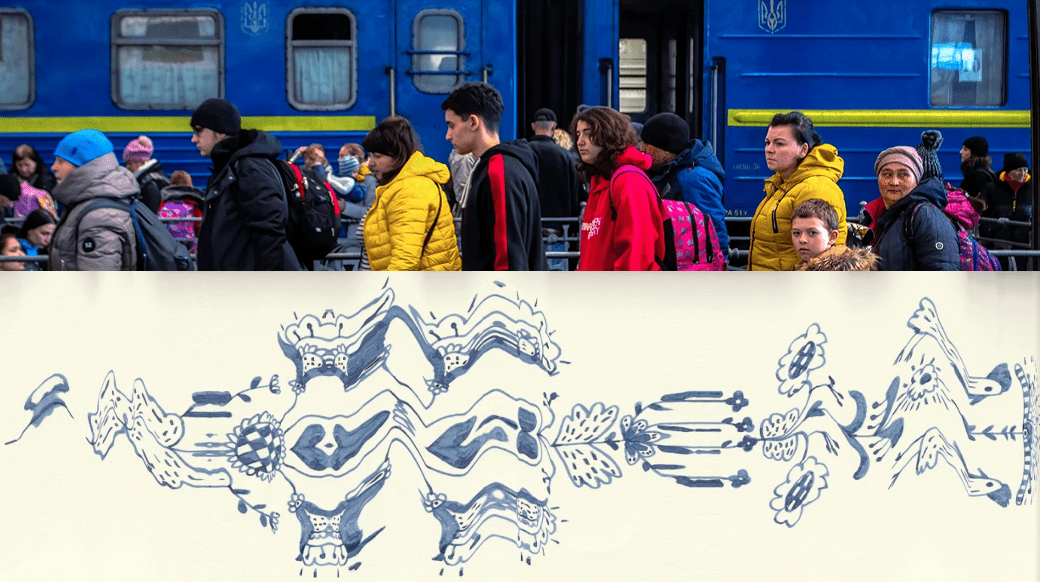I’ve always lived a sort of double life; this constant feeling that I’m too Australian to be Ukrainian but too Ukrainian to be Australian. In some ways, I’m happy I never had the chance to play netball or go to sleepovers, those countless hours studying Ukrainian language and culture have finally paid off.
It was an ever-present fear in my family that the Russia/Ukraine tensions would boil over, but the shock that came with those first Russian bombs opened up a new world of fears.
I hadn’t seen my grandparents, who are from Zaporizhzhia, in over 7 years. Our phone conversations were never longer than asking how each other was, but everything changed on 4 March this year when we found out their city had been occupied by Russian troops. In the face of the unfolding threat of Europe’s largest nuclear power plants (which are also in Zaporizhzhia) becoming compromised and leading to a nuclear disaster, I got scared.
By the very next week, both my grandparents were on a flight to Australia.
Historically, Zaporizhzha was a Cossack stronghold: a land of free men who defended their homeland. This year, it’s under Russian fire for the first time in over 300 years. The artillery attack on the Zaporizhzian nuclear plant was condemned around the world, and denounced as a war crime by Ukraine and the US embassy in Kyiv.
“Why is it so popular to care now?” my Mama asks, “everyone said it was inevitable but only chooses to open their eyes now.” Ever since the fall of the Soviet Union, and particularly since the Maidan Revolution in 2014, the Ukrainian people have been pushing away from Russia.
My other grandparents, who emigrated from Ukraine in the 60s, have also always been a key part of my life. But toward my newly-refugee grandparents, since they arrived in my living room almost a month ago, I have felt so disconnected from them
They know all about me, but I know nothing of them. I feel like a stranger, passing them in the kitchen, and my dedushka snoring on the couch and my babushka making a pot of borscht every other day.
Slowly, I’m becoming more comfortable with my own family. They ask how my studies are, how work is and about Australian reality TV — which they don’t understand a word of, yet still finding the fights on MAFs hilarious. When we watch the Ukrainian news, a 24hr stream of the war, it’s clear to see how much I’m yet to understand.
It feels so far away, the bombings in Mariupol, the ruins in Kharkiv, and their decision to leave. It also feels closer than ever, the daily death toll, the constant phone calls,the overwhelming noise of it all. I wonder what kind of a person I would be if my family never left Ukraine. Would our dinner table discussions have grown into the moral considerations; ‘would you flee your home or defend it?’, ‘to live or to die?’
We were lounging around the kitchen one day, when a Qantas plane flew noticeable low over us. “The Russian planes flew past our apartment real low” my babushka says in the dead silence.
We share wacky-grandparent-moments intermittently, such as finding my dedushka making porridge at 3am. Yet there’s always a constant reminder of what’s happening in Ukraine – long calls checking if their friends and other family are ok – the smallest of banal routines setting off memories of their old life.
Australia has promised humanitarian visas to Ukrainians fleeing the war, allowing them to work, access Medicare, and to continue their education for up to 3 years. This, along with an influx of a growing Ukrainian diaspora, means my grandparents are here to stay – possibly forever.
I don’t want to call this an eye-opening experience, but it’s progressively changing the outlook of my own heritage. There’s been an immense resurgence in patriotism, a cultural revival amongst the diaspora; our only hope now is to keep our language, culture, and family alive.





